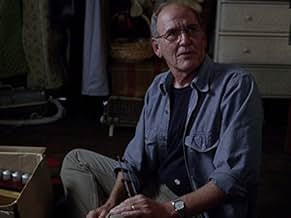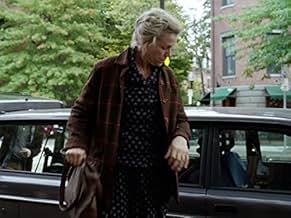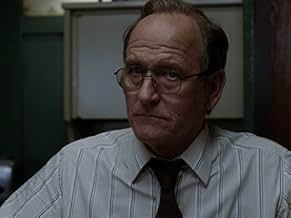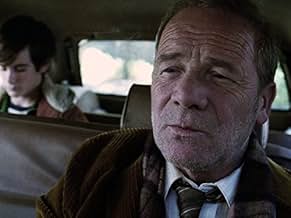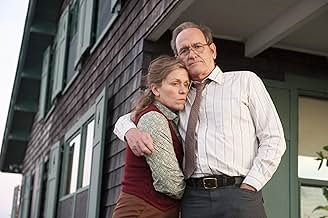L'insegnante di matematica della scuola media, Olive, e il suo matrimonio con Henry, che dura da 25 anni.L'insegnante di matematica della scuola media, Olive, e il suo matrimonio con Henry, che dura da 25 anni.L'insegnante di matematica della scuola media, Olive, e il suo matrimonio con Henry, che dura da 25 anni.
- Vincitore di 8 Primetime Emmy
- 31 vittorie e 35 candidature totali
Sfoglia gli episodi
Recensioni in evidenza
I've just read some of the negative reviews about Olive Ketteridge. I thought it was obvious what we were getting into in the first 30 minutes of this brilliant mini series. Yes it's a bit downbeat. But Olive Ketteridge is about real people and real situations, and let's face it it reflects certain areas of real life. I think we've all known characters like the ones portrayed in Olive Ketteridge. All the performances are spot on. Plus there are many areas of Olive Ketteridge that made this viewer smile. So I don't see the negativity. Maybe the negative reviews come from people who wanted to see a Deloris Claybourne or a True Detctive. Olive Ketteridge is about love, loss and what ifs, and that's about it.. But it's told so well that one almost forgets that the story's so simple.
Never comfortable to watch, this gem as a story and as a vehicle for incredible performances is not to be missed. The story can be summarized in a very brief exchange between Olive and her husband Henry. The latter, a sucker for greeting cards it seems, buys Olive a simple little card that says "For My Wife". Inside the message is "Simply to say I love you" and his initial as a signature. It's Fathers Day, but he has purchased his wife some flowers and this card. He hands her the card and says "I love you." She reads it and replies "Yes, you do", handing him back both the card and the flowers with dirty garden-stained hands.
This is a dark, dismal, dreary narrative with extreme moments of touching emotion and fleeting happiness. Life for all of the characters in this story is a constant succession of negativity and hopelessness. And Olive is The Queen of the Depressed. Townspeople, too, are for the most part, cantankerous: Henry's initial store clerk; Olive's friend, Bonnie; the high school secretary; a customer standing in line at a pharmacy. Someone peed in all of their cereal. And it is the pathetic,somebody's-gotta-play-the-clown Henry who recommends to a Valium-addicted schizophrenic customer that she buy brighter light bulbs to fend off depression.
The performances are so intricate and under-played. How can playing a depressed person be intricate? Watch Frances McDormand's depiction of Olive. It's a must for any actor, and sheer joy for an audience member. And the supporting cast's performances are no less exemplary. Richard Jenkins as Henry provides phenomenal contrast. He really is the "yang" to Olive's "yin". And it is precisely this complementary distribution in their philosophies of life (as characters) and performances (as actors) that makes this truly one of the most amazing films. However, it is frequently extremely uncomfortable to watch because of the level of negativity we are compelled to watch. There are two scenes (one on a seaside cliff and the other at a piano bar) that are positively creepy but so perfect for the character who is envisioning them, another inhabitant of this Village of the Damned. Are there any happy people in this town? No. Henry and maybe one or two other characters try to cheer things up, but one feels as if they are doomed in their attempts to shed light on the rest.
This drama is sadly sympathetic, and no less pathetic a depiction of a jaundiced relationship than George and Martha in "Who's Afraid of Virginia Woolf?" The latter is certainly more bombastic than this film, which makes "Olive Kitteridge" even sadder as it is reflected in these lives of quiet desperation.
These are award-winning performances, script, and film. Don't miss it.
This is a dark, dismal, dreary narrative with extreme moments of touching emotion and fleeting happiness. Life for all of the characters in this story is a constant succession of negativity and hopelessness. And Olive is The Queen of the Depressed. Townspeople, too, are for the most part, cantankerous: Henry's initial store clerk; Olive's friend, Bonnie; the high school secretary; a customer standing in line at a pharmacy. Someone peed in all of their cereal. And it is the pathetic,somebody's-gotta-play-the-clown Henry who recommends to a Valium-addicted schizophrenic customer that she buy brighter light bulbs to fend off depression.
The performances are so intricate and under-played. How can playing a depressed person be intricate? Watch Frances McDormand's depiction of Olive. It's a must for any actor, and sheer joy for an audience member. And the supporting cast's performances are no less exemplary. Richard Jenkins as Henry provides phenomenal contrast. He really is the "yang" to Olive's "yin". And it is precisely this complementary distribution in their philosophies of life (as characters) and performances (as actors) that makes this truly one of the most amazing films. However, it is frequently extremely uncomfortable to watch because of the level of negativity we are compelled to watch. There are two scenes (one on a seaside cliff and the other at a piano bar) that are positively creepy but so perfect for the character who is envisioning them, another inhabitant of this Village of the Damned. Are there any happy people in this town? No. Henry and maybe one or two other characters try to cheer things up, but one feels as if they are doomed in their attempts to shed light on the rest.
This drama is sadly sympathetic, and no less pathetic a depiction of a jaundiced relationship than George and Martha in "Who's Afraid of Virginia Woolf?" The latter is certainly more bombastic than this film, which makes "Olive Kitteridge" even sadder as it is reflected in these lives of quiet desperation.
These are award-winning performances, script, and film. Don't miss it.
This is an extra-ordinary piece of television. Where so many mini-series are constantly driven by a thread that drives it forward with momentum, this doesn't have that same urgency, which allows it to explore its themes in a way I don't think many TV series or mini-series have done. It's so wonderfully crafted, in all aspects. But really, it's the writing and performances where its true power soars. The acting is magnificent, McDormand might've just outdone her work in Fargo. A truly soulful, aching, incredibly heartfelt performance. We see Olive and her various flaws, and yet we can't help but sympathize with her and like her despite everything she does. The mark of a true revelation. Kind of hard to describe in words, but the acclaim is justified.
I love Frances McDormand and Richard Jenkins since I saw them both in Burn after reading. That was when I started to collect (and see) all movies from the Coen brothers, including Fargo, where Frances McDormand was very good. And I always see every movie which has Richard Jenkins as well. But that here was when I realized how incredibly good actors they both are, it just was magic. Like I was spying on some family somehow, you never felt it was just acting. The story was sad, and sometimes embarrassing, but it had wonderful pictures and it was so.... human. I had to keep looking. And in the end there was hope as well. So maybe I should have given more than 8 points, for the acting was definitely 10/10.
I've had some time to review the reviews of this miniseries. It would seem that the subset of posters that moan "why would anybody watch this depressing series and mean spirited" title character are predisposed to not like an excellent, and nuanced drama and see it instead as trauma. One poster went as far as to say why would they "hurt" themselves by watching this. It seems the point that this is a character study seldom found on TV was missed by those predisposed to miss it.
A few other things missed. The show details a fascinating study of interpersonal attitudes. On a surface Olive is "mean spirited", but more objectively she is a conduit of truth going her entire life stating what is fairly accurate feedback. She is highly intelligent, analytical, (Math teacher) and see's through others shortcomings, challenges, and openly comments on them. For this, in an age of non stop reinforcement, coddling, unconditional regard, she is viewed as a "witch" evil, destructive, and generally the reason all is wrong with others. Ignoring entirely the shortcomings, or very similar nihilism exhibited by almost all the other characters. Starting with her son who this viewer also saw as "mean spirited" but without any regard, and less virtue. The son seems to evaluate every adult he comes into contact with dismissively, or with lack of regard. From the outset one see's this character as one who will go through the rest of their life in therapy, blame others for their being, and while being caustic in interactions and even with peers. Including the student who Olive defended. A student she defended from cruelty, and even from her own son. The son exists as a borderline sociopath throughout. Not connected with family enough to even spend time at the dinner table. Judging and smirking in nearly every scene. Seemingly oblivious to any of his own interactional characteristics. Later in life we see the son as somebody who is a punitive rather than permissive with children and who has oddly learned to be inflexible and impatient as a parent but who now rants about the influences of Olive while doing worse to the children he rears.
Lost entirely is the son living a comparatively idyllic life on a beautiful property in Maine. A property with beach, walking paths, places for children to explore. What child wouldn't love that opportunity? Contrast this with the bombed out backyard in the neighborhood with dog feces sidewalks and urban decay that the younger couple has chosen as a place to raise children. Complete with a spouse who drinks during pregnancy because yeast is good or some such nonsense. In other words harming a child even before birth. But this same mother, despite her own obvious flaws (for instance not providing her progeny with stable fathers or stable upbringing) is flatly dismissive of Olive making her apologize to an acting out child, demeaning her, talking down to her, and figuratively with Olive put in the dingy basement room which is symbolic of imposed hierarchy. Contrast this with the beautiful property and house granted to Chris and his short lived wife. These are intentionally put in as contrasting comparisons of respective treatment.
Reasonable commentary can occur that the truly " mean spirited" actions are taken up by some of the younger people featured in the series that are entirely dismissive, mocking, and mean at least in response to Olive. Because she doesn't match the unconditional regard prototype, and she is instead, honest. Watch the series a second time and witness how many times Olive is actually wrong in an assessment. She merely lacks the white lies inherent in contrived nicety. The kind of nicety that smiles at you with forced raised lips but that curses and demeans the mother of the son at her wedding when Olive is thought not to be in earshot.
Another inter-generational prejudice is featured when the Fathers ex employee openly, and contemptuously questions the sale of the pharmacy and that they take advantage of "people like you". The disrespect was so blatant that the nice to a fault Henry was virtually forced to respond "its none of your business". The employee owes Henry his career, his opportunity, and even his wife (which Henry setup) but is openly disrespectful of him. An under riding theme throughout is a world turned upside down (or is it) of children in control, of parents getting down on their knees apologizing, and ignoring behavior at every turn. Interestingly the same Chris who viewed his parents relationship dismissively engages in a marriage that lasts a few months and in which he is sleeping in bed, while his wife curses looking for an earring on the wedding night. A couple who's relationship was over before it even started.
Interestingly the few deepest characters in the movie, including the husband, and Bill Murray, as well as the depressed young man, and the waitress, they get Olive, they get what she see's. In the end Olive saved all of them and including herself. That's the last, and integral part missed, is that Olive isn't just mean, she's a seeing savior.
A few other things missed. The show details a fascinating study of interpersonal attitudes. On a surface Olive is "mean spirited", but more objectively she is a conduit of truth going her entire life stating what is fairly accurate feedback. She is highly intelligent, analytical, (Math teacher) and see's through others shortcomings, challenges, and openly comments on them. For this, in an age of non stop reinforcement, coddling, unconditional regard, she is viewed as a "witch" evil, destructive, and generally the reason all is wrong with others. Ignoring entirely the shortcomings, or very similar nihilism exhibited by almost all the other characters. Starting with her son who this viewer also saw as "mean spirited" but without any regard, and less virtue. The son seems to evaluate every adult he comes into contact with dismissively, or with lack of regard. From the outset one see's this character as one who will go through the rest of their life in therapy, blame others for their being, and while being caustic in interactions and even with peers. Including the student who Olive defended. A student she defended from cruelty, and even from her own son. The son exists as a borderline sociopath throughout. Not connected with family enough to even spend time at the dinner table. Judging and smirking in nearly every scene. Seemingly oblivious to any of his own interactional characteristics. Later in life we see the son as somebody who is a punitive rather than permissive with children and who has oddly learned to be inflexible and impatient as a parent but who now rants about the influences of Olive while doing worse to the children he rears.
Lost entirely is the son living a comparatively idyllic life on a beautiful property in Maine. A property with beach, walking paths, places for children to explore. What child wouldn't love that opportunity? Contrast this with the bombed out backyard in the neighborhood with dog feces sidewalks and urban decay that the younger couple has chosen as a place to raise children. Complete with a spouse who drinks during pregnancy because yeast is good or some such nonsense. In other words harming a child even before birth. But this same mother, despite her own obvious flaws (for instance not providing her progeny with stable fathers or stable upbringing) is flatly dismissive of Olive making her apologize to an acting out child, demeaning her, talking down to her, and figuratively with Olive put in the dingy basement room which is symbolic of imposed hierarchy. Contrast this with the beautiful property and house granted to Chris and his short lived wife. These are intentionally put in as contrasting comparisons of respective treatment.
Reasonable commentary can occur that the truly " mean spirited" actions are taken up by some of the younger people featured in the series that are entirely dismissive, mocking, and mean at least in response to Olive. Because she doesn't match the unconditional regard prototype, and she is instead, honest. Watch the series a second time and witness how many times Olive is actually wrong in an assessment. She merely lacks the white lies inherent in contrived nicety. The kind of nicety that smiles at you with forced raised lips but that curses and demeans the mother of the son at her wedding when Olive is thought not to be in earshot.
Another inter-generational prejudice is featured when the Fathers ex employee openly, and contemptuously questions the sale of the pharmacy and that they take advantage of "people like you". The disrespect was so blatant that the nice to a fault Henry was virtually forced to respond "its none of your business". The employee owes Henry his career, his opportunity, and even his wife (which Henry setup) but is openly disrespectful of him. An under riding theme throughout is a world turned upside down (or is it) of children in control, of parents getting down on their knees apologizing, and ignoring behavior at every turn. Interestingly the same Chris who viewed his parents relationship dismissively engages in a marriage that lasts a few months and in which he is sleeping in bed, while his wife curses looking for an earring on the wedding night. A couple who's relationship was over before it even started.
Interestingly the few deepest characters in the movie, including the husband, and Bill Murray, as well as the depressed young man, and the waitress, they get Olive, they get what she see's. In the end Olive saved all of them and including herself. That's the last, and integral part missed, is that Olive isn't just mean, she's a seeing savior.
Lo sapevi?
- QuizFrances McDormand bought the rights of the novel years before she could make it into anything. Her involvement extended to the point of hiring writer Jane Anderson, director Lisa Cholodenko and co-star Richard Jenkins.
- ConnessioniFeatured in 72nd Golden Globe Awards (2015)
I più visti
Accedi per valutare e creare un elenco di titoli salvati per ottenere consigli personalizzati
- How many seasons does Olive Kitteridge have?Powered by Alexa
Dettagli
- Data di uscita
- Paese di origine
- Sito ufficiale
- Lingua
- Celebre anche come
- Олівія Кіттерідж
- Luoghi delle riprese
- Aziende produttrici
- Vedi altri crediti dell’azienda su IMDbPro
- Tempo di esecuzione1 ora
- Colore
- Mix di suoni
- Proporzioni
- 1.78 : 1
Contribuisci a questa pagina
Suggerisci una modifica o aggiungi i contenuti mancanti


